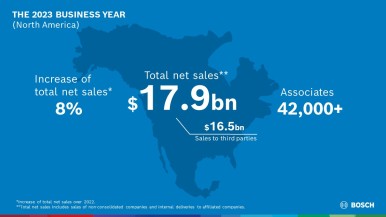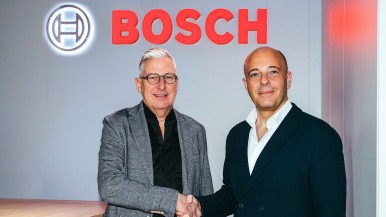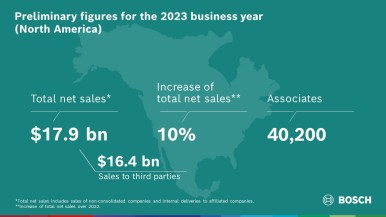“North America continues to be an important market for Bosch,” said Mike Mansuetti, president of Bosch in North America. “Our focus is on developing advanced technologies, especially within the Internet of Things, that enable the future of mobility, connected cities, consumer goods and manufacturing facilities. We expect Bosch to remain at the forefront of the connected world, bolstered by strategic investments across North America.”
For 2018 Bosch in North America expects healthy growth over the prior year, driven primarily by the Mobility Solutions business sector. The three other business sectors are also forecasting positive development in 2018. The number of associates is expected to remain at a level similar to 2017.
Bosch continues to invest in North America
Bosch continued to make significant investments in its manufacturing facilities across the North America region, investing nearly $470 million (413 billion euros) in 2017. Key highlights from the year include the opening of a 104,000-square-foot Research and Technology Center in Sunnyvale, California; the launch of an assembly plant for automotive steering in Querétaro, Mexico; the opening of a new center of innovation and business accelerator in Guadalajara, Mexico; and an expansion of a dishwasher plant and central distribution center in New Bern, North Carolina.
The new facility in Sunnyvale provides 40 percent more space than its former location and consolidates roughly 200 team members from Bosch Corporate Research, Robert Bosch Venture Capital and various Bosch business divisions into one building. Its 20-year presence in Silicon Valley enables Bosch to collaborate with technology companies and academic communities as it develops technology innovations in areas such as artificial intelligence, automated and connected driving, data mining, and advanced circuits and sensors.
Development of Bosch business sectors
Bosch’s innovative solutions, strategic investments and partnerships across its four business sectors – Mobility Solutions, Consumer Goods, Industrial Technology, and Energy and Building Technology – have made the connected future a reality. From connected vehicles and home appliances to smart cities and Industry 4.0 applications, Bosch’s solutions help to ensure a safe, energy-efficient and comfortable way of living.
Sales in the Consumer Goods and Industrial Technology business sectors increased over 2016, while Energy and Building Technology sales were in line with the previous year and Mobility Solutions sales were slightly lower.
Bosch Mobility Solutions leads with strategic partnerships
Mobility Solutions is Bosch’s largest business sector. With 2017 sales in North America at $9.0 billion, Mobility Solutions composes 66 percent of total sales in the region. The sector focuses on automated, connected and electrified vehicle technologies.
In 2017 Bosch announced a partnership with Nikola Motor Co. to bring to market the first-ever powertrain for electric long-haul commercial vehicles. To meet the goal of launching production by 2021, Nikola and Bosch will commercialize the world’s first true dual-motor commercial-vehicle eAxle – a scalable, modular platform with the motor, power electronics and transmission in one compact unit – for a long-haul truck. The eAxle will use proven commercial-vehicle electric machine technology and SMG (separate motor generator) motors from Bosch. The eAxle will be paired with a custom-designed fuel cell system, developed jointly between Nikola and Bosch, for the world’s first dual-motor, electric long-haul commercial vehicles.
In September Bosch debuted its 15-inch freely programmable connectivity cluster, the largest digital instrument cluster available for commercial vehicles.
Bosch continues to build solutions on the path to fully automated driving. In 2017, the global supplier announced a breakthrough in the development of high-resolution maps for automated driving. Bosch became the first worldwide to create a localization layer using radar signals. It also announced a partnership with Sony Semiconductor Solutions to develop a highly innovative camera technology that will enable cars to reliably sense their surroundings even in difficult lighting conditions.
The future of connected mobility includes community-based parking: Utilizing digital maps created by real-time data measured by the vehicle, Bosch’s system helps drivers find the nearest available parking space quickly and safely. Bosch is planning to launch community-based parking in up to 20 U.S. cities in 2018. In places such as Los Angeles, Miami and Boston, the company will make real-time information about on-street parking available to car manufacturers.
Bosch Consumer Goods offers convenience with connectivity
Sales for Bosch’s Consumer Goods business sector in North America were $2.5 billion. BSH Home Appliances recently announced the largest and most significant launch in the 102-year history of its Thermador™ brand, debuting 300 new products with more than 800 innovations. Thermador also introduced the Thermador Connected Experience by Home Connect™, an industry-exclusive app that connects the consumer to exclusive personalized content, unique partnerships and customized product guidance. Bosch Home Connect is a dynamic ecosystem created to connect home appliances to the Internet of Things. Through its powerful open platform, Home Connect leads the appliance industry by providing a growing network of partners and services.
The Power Tools division continues to embrace the maker movement. In September, Dremel introduced the first-of-its-kind Dremel DigiLab Laser Cutter, designed to cleanly slice through materials like wood, acrylic, leather and paper, as well as neatly engrave surfaces such as glass and anodized metal. Dremel designed this machine to provide makers of all levels and practices with an outlet for innovation. As the brand’s latest addition to its lineup of digital fabrication tools, it has the ability to customize a variety of materials more quickly and easily than ever before. Backed by 85 years of Dremel brand legacy, the Dremel DigiLab Laser Cutter will provide a higher level of safety, ease, reliability and quality to users. Additionally, Dremel released the Stylo+, the brand’s first specialized arts and crafts tool. Crafted with the comfortable ergonomics of a pen, the Stylo+ is a lightweight crafting tool that empowers creative makers to engrave, carve, polish and sand with ease. Dremel also released the brand’s first-ever powered cleaning tool, the Dremel Versa, which features four interchangeable accessories for indoor and outdoor cleaning.
Bosch Power Tools also announced an open pilot for its Bluehound asset tracking solution, a major step toward total connectivity on a complex construction site. In addition, the Bosch CORE18V battery continues to be a game-changer for professional users in construction and the trade markets, who demand more power and greater runtime.
Industrial Technology provides connected industry products
The Industrial Technology sector’s sales reached $1.4 billion in North America. Bosch Rexroth, one of the world’s leading suppliers in drive and control technologies, saw strong growth in mobile hydraulics resulting from recovery in the construction, mining, offshore and other industries. Rexroth also launched numerous innovations to empower modern manufacturing, from data visualization tools such as ActiveCockpit, IoT Gateway and Improvidus to a broad range of connected hydraulics for predictive maintenance and condition monitoring in heavy machines and equipment. These Industry 4.0 solutions save time and costs. The digital transformation in manufacturing will continue to influence growth in this segment for the coming years. By 2020 the Bosch Group aims to generate more than a billion euros with connected industry.
Energy and Building Technology grows with thermotechnology, video cameras
Sales for the Energy and Building Technology sector in the region were $800 million. Bosch’s Thermotechnology division opened a psychrometric lab, sound lab and testing facility in its new Watertown, Massachusetts, North American headquarters. The lab is designed to test heating and cooling technologies. At this location, the Thermotechnology division develops products specifically for the U.S. market. The group also has seen growth from its investment in its new air conditioning business unit.
Bosch’s Building Technologies division (formerly Bosch Security Systems) introduced a new “i” series of video security cameras with built-in video analytics. Through intelligent data capturing and connectivity, the “i” series video cameras provide alerts to improve security monitoring for businesses and the general public. The captured data can also be used for purposes beyond security to make smarter business decisions, such as monitoring presence to reduce utility bills, identifying patterns in customer activity to improve sales in retail environments, and more.
Bosch research and development
In addition to the new Sunnyvale location, Bosch also has Research and Technology Centers in Pittsburgh as well as Cambridge, Massachusetts.
Three areas of research are computational material science, additive manufacturing and artificial intelligence. Computational material science involves simulating materials at the atomistic scale to better understand their properties. Such simulations allow for fast computer scanning of large arrays of chemical compounds before selecting the most promising ones for synthesis and physical evaluation. These simulations significantly speed up the development and discovery of new materials, for example, in the design of efficient fuel cells.
For additive manufacturing (AM), researchers are working on industrialization of AM processes and scouting of new AM technologies. The team is developing process monitoring and simulation capabilities to enable increased productivity and quality.
The Bosch Center for Artificial Intelligence was established in 2017 to further accelerate adoption of AI in Bosch products and processes. BCAI brings together global expertise from Sunnyvale; Bengaluru, India; and Renningen, Germany.
Bosch’s community giving efforts reach $20 million milestone
Supporting local communities through grants and volunteering continues to be a top priority for Bosch.
Since its first grant in 2012, the company’s U.S.-based foundation, the Bosch Community Fund, has awarded more than $20 million to organizations and educational institutions across the U.S. In 2017, the Bosch Community Fund, which focuses on promoting STEM (science, technology, engineering and math) and environmental sustainability initiatives, provided 183 grants to various organizations in 40 communities across the country.
Bosch volunteers in communities
Bosch associates in North America also volunteer tens of thousands of hours to benefit community organizations, including FIRST® Robotics and various other STEM educational programs.
Bosch sponsors 21 FIRST Robotics teams throughout North America, and Bosch associates have volunteered more than 15,000 hours per year to mentor and coach teams.
Bosch also partners with Michigan Technological University’s Mind Trekkers to bring The Bosch Experience to STEM festivals across the country. The corporate social responsibility program guides young attendees through fun interactive experiments, offering them a connection between a love for science and a rewarding career.
In addition, Bosch North America’s water conservation efforts have reduced water consumption by 46 percent across all of its locations since 2013, including a 14 percent – 19.2 million gallon – reduction in water consumption between 2016 and 2017.
Bosch Group: Global strategy and business outlook for 2018
Globally, Bosch is aiming for further growth in 2018, despite the difficult economic climate. After achieving record results in 2017, and in light of economic and geopolitical risks, the Bosch Group expects its sales revenue to grow by 2 to 3 percent in 2018. In the first three months, the sales revenue generated by the company matched the high level of the same period of the previous year, and even increased by around 5 percent when adjusted for exchange-rate effects.
“Our company is unequaled when it comes to combining comprehensive connectivity expertise with broad industry and product know-how. This is the Bosch Group’s unique selling proposition,” said the Bosch CEO Dr. Volkmar Denner, speaking at the annual press conference in Renningen. Denner sees improving the quality of life and contributing to eco- and climate-friendliness at the top of Bosch’s agenda: “Our ‘Invented for life’ ethos is our motivation for developing the best possible technologies for environmental protection. We want to help keep people mobile, while improving air quality.”
To make practically zero-emissions traffic reality, the company is making heavy investments – both in making electromobility a market success and in enhancing the combustion engine. Bosch has now achieved a breakthrough in diesel technology: With their new diesel technology, Bosch engineers have succeeded in getting NOx emissions down to one-tenth of the legally permitted limit. On average, test vehicles equipped with the enhanced technology already emit no more than 13 milligrams of NOx per kilometer, or far less than the 120 milligrams that will be permitted in Europe after 2020. “There’s a future for diesel. It will remain integral to tomorrow’s mobility solutions,” the Bosch CEO said. [More detailed information on these technological advances can be found here.]





